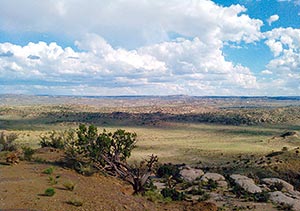Study: America’s Tribes most impacted by climate change
Read the whole thing here at the Navajo Times.
A recent study by the National Wildlife Federation concluding that America’s tribes are the people most impacted by climate change was greeted with a resounding “Well, duh!” from the indigenous environmentalist community.
However, some activists are hopeful it will open some eyes to a situation they perceive as critical.
The study, titled “Facing the Storm: Indian Tribes, Climate-Induced Weather Extremes, and the Future for Indian Country” paints a dire picture … Alaskan Native villages sliding into the sea, sacred forests reduced to ashes in massive fires, drought on some reservations and flooding on others.
The tribes are particularly vulnerable, it concludes, because Native people are physically and culturally dependent on the land, and because of financial constrictions, less able to prepare for or deal with natural disasters.
[…]
Even in her home community of Dilkon, she sees some serious denial.
“They’re talking about building a hospital,” she said. “We don’t have enough water for a Laundromat. How are we going to build a hospital?”
Alex doesn’t just blame the government. Navajos have become so used to doing without, she said, they’ve become complacent.
“We haven’t been challenging our government,” she said. “We have to ask them, ‘How are we preparing for climate change? How are we going to continue to live as Navajos?’”
[…]
 Clouds and shadows drift across a valley south of Gallup. (Special to the Times - Donovan Quintero)
Clouds and shadows drift across a valley south of Gallup. (Special to the Times - Donovan Quintero)












